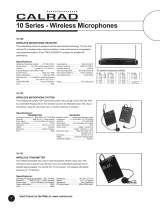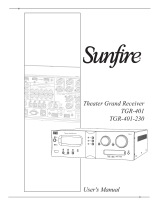Page is loading ...

Quick Start Guide
LT-84 ListenIR Transmitter/Radiator Combo
LA-141 ListenIR Expansion Radiator

Determine Unit Placement
Determine the optimum location where the LT-84 and LA-141 units will
cover the intended area. Preferably, mount the units above and point
them towards the listening audience. Units cannot be concealed behind
walls, curtains, or treated glass, as Infrared (IR) light needs a clear
line-of-sight path to the receiver for best performance.
Mounting Options
The units can be mounted on the ceiling, wall, or desk with the mounting
hardware (included). The threaded connectors on the top and bottom of
the units are a standard size which fits most camera tripods. These
threaded connectors can also be used to connect two units together.
LT-84 Setup
1. Plug power supply into the unit.
2. Connect desired audio input signal to one of the three input connector
types on channel 1, 2, or both.
Safety/Security
Cable Slot
Mic
Input
Level Control
Knob
Frequency
Selector
Mic
Input
Level Control
Knob
Frequency
Selector
Expansion Link
Output RJ-45
Amber LED
(Status Indicator)
Power Input
Power Switch
Indicator Lights
On/Off
RCA Input
(Stereo)
Line Input
Level
Indicators
Transmission
On/Off
RCA Input
(Stereo)
Line Input
Level
Indicators
Transmission
On/Off
Green LED
(Power Indicator)
LT-141 Rear View
Safety/Security
Cable Slot
Indicator Lights
On/Off Switch
Expansion Link
In/Out RJ-45
Amber LED
(Status Indicator)
Green LED
(Power Indicator)
Channel 1
Delay
Compensation
Channel 2
Delay
Compensation
LT-84 Rear View

Cable
Length
2.3 MHz
2.8 MHz
3.3 MHz
3.8 MHz
Cable
Length
2.3 MHz
2.8 MHz
3.3 MHz
3.8 MHz
1 to 9 ft.
0.3 to 2.8 m
0
3
3
2
50 to 59 ft.
15.2 to 18 m
3
2
2
1
10 to19 ft.
3 to 5.8 m
3
3
3
2
60 to 69 ft.
18.3 to 21m
3
2
2
1
20 to 29 ft.
6 to 8.8 m
3
3
2
2
70 to 79 ft.
21.3 to 24 m
3
2
1
1
30 to 39 ft.
9.1 to 11.9 m
3
3
2
2
80 to 89 ft.
24.4 to 27.1 m
3
2
1
1
40 to 49 ft.
12.2 to 14.9 m
3
3
2
2
90 to 100 ft.
27.4 to 30.5 m
3
2
1
0
3. Turn power switch to the “indicator lights on” position*
4. Adjust audio level input knob until the audio level LEDs are solid green
with an occasional red flicker with audio peaks.
5. Select the desired transmission frequency and turn on the channel
transmission switch.
*Once the unit is adjusted, the power switch can be turned to the
“indicator lights off” position, if desired.
Note: The LT-84 and receivers need to be on the same frequency/channel
for proper operation.
LA-141 Setup
1. Turn the LT-84 power switch to the off position.
2. Connect the LA-141s to the LT-84 via a CAT-5e 24 AWG cable.†
3. Turn the LT-84 and LA-141 power switches to the “indicator lights on”
position.‡
†Up to 2 LA-141s can be daisy chained to each Expansion Link Output
RJ-45 connector with a daisy chain maximum cable length of 100 ft. (30 m).
‡Under normal operation the green and amber LEDs on the RJ45
connector of both the LT-84 and LA-141 will be illuminated.
Set Delay Compensation
For a single channel application, set both channel 1 and 2 delay
compensation switches to the same setting. For a two-channel
application, set delay compensation switches for channel 1 and 2
independently. Pick appropriate frequency row, then select the column
that describes the overall cable distance from the LT-84 to the LA-141
being set. This is the appropriate delay compensation switch setting.
Delay Compensation Switch Setting

Connection
LT-84
Power
Power Supply
Microphone (Electret)
Unbalanced Audio Source
MIC
RCA
Phoenix
Connector
Cat-5e
(24 AWG)
LA-141 (Optional)
LA-141 (Optional)
Balanced Audio Source
Cat-5e
LA-141 (Optional)
LA-141 (Optional)
Cat-5e
LISTEN TECHNOLOGIES 14912 Heritage Crest Way, Bluffdale UT 84065 USA
Phone: +1.801.233.8992 Toll-Free: 1.800.330.0891 www.listentech.com
Copyright © 1998 - 2019 Listen Technologies Corporation. All rights reserved. Patented Technology (pat. 9,712,246). 20190522
For more detailed information see user’s manual:
http://www.listentech.com/support/manuals/
/

